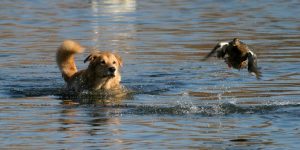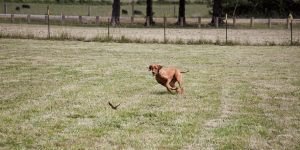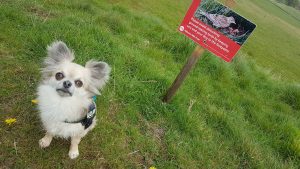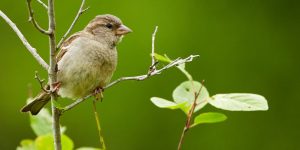Responsible Dog Walking During Bird Nesting Season
UK bird species have been in decline for over 50 years and this is of great concern to conservationists. Read our Holidays4Dogs article to find out how you can help our UK birds when walking your dog in the countryside – especially during bird nesting season.
Between 2015 and 2020, Britain lost 48% of its wild bird population. This is a shocking figure, but birds have been steadily declining over the past 50 years. According the Natural History Museum, if birds continue to decline in this way, year on year – it is quite possible that future generations may grow up never having heard the sound of a song thrush, or skylark.
The RSPB say one in six birds have been lost since 1980. This constitutes an overall loss of 600 million birds over a period of 40 years. These will be shocking figures for animal lovers worldwide.
When is bird nesting season?
 The busiest time for our feathered friends in the UK, is between March 1st and the end of July.
The busiest time for our feathered friends in the UK, is between March 1st and the end of July.
Walking with our four-legged friends is one of the most pleasurable aspects of living with dogs – especially when you can watch them run free and frolic in the open countryside.
However, in 2023 Wildlife Trusts across the UK reported multiple instances of dogs chasing livestock and disturbing wildlife.
The Bedfordshire, Cambridgeshire and Northamptonshire Wildlife Trust found that off-lead dogs were the cause of 40% of wildlife disturbances compared to 5% by dogs on leads.
These figures show, that keeping dogs on leads has a positive effect on wildlife – and therefore, dog owners can all do their bit to help protect birds and other animals in the countryside, by keeping their dogs under control.
Of particular concern to wildlife conservationists, is the disturbance of ground-nesting birds like skylarks, corn bunting and curlews. Research shows there has been a massive decline in these species – 66%, in fact, compared to other types of birds.
Dog owners can do their bit to help wildlife
Being a responsible dog owner is important, but nowhere does this have more impact than when you are out with your dog in public, or in the countryside. Having your dog out of control in a public place can have huge consequences.
Some of these consequences can mean fines or even prosecution. It is in every dog owner’s interest to make sure their dog is always properly under control – especially around livestock and other animals.
There are certain times and specific places, where it is appropriate to keep dogs on leads. Holidays4Dogs promotes responsible dog ownership, especially when it comes to mixing  with livestock, wild animals and birds.
with livestock, wild animals and birds.
While tree-nesting birds are usually safe from free-roaming dogs, parent birds can still become distressed by the presence of dogs. Therefore, it is important not to allow dogs to ‘worry’ birds while off lead.
In 2016, Chris Packham spoke passionately about responsible dog walking during the nesting season, pointing out the importance of protecting British wildlife.
Many dogs have natural instincts to hunt and chase which can have a detrimental effect on birds attempting to build nests.
Nesting birds can be frightened away from their young by over-exuberant dogs and their nest can even be destroyed in the process. In addition, dogs can get themselves into danger by blindly running after wildlife.
What does the Natural England Countryside Code say?
“access rights that normally apply to open countryside and registered common land (known as ‘open access’ land) requires dogs to be kept on a short lead between 1 March and 31 July, to help protect the ground nesting birds, and all year round near farm animals”.
Ground-nesting birds are often overlooked. Species such as skylarks, which have a wonderful melodic warble, are even more vulnerable to being disturbed.
In the Malvern Hills, Worcestershire, there are many ground-nesting skylarks on the lower slopes of common land.
The Malvern Hills Trust places signs asking people to keep to the paths and keep dogs on leads. This is an important measure to help protect these beautiful birds.
According to Farmers Weekly (2021) there has been a decline in ground nesting birds in recent years. Much of this has to do with farmland management and a lack of habitats.
However, farmers and land managers are working hard to try and reverse this situation by implementing grass margins, Agri-environment schemes and fallow plots. Being a responsible pet owner while dog walking can help to keep nesting birds safe and thriving.
Unfortunately, loose dogs don’t help the situation. A dog rushing over to a nesting spot can cause the parent birds to abandon their nest. When this happens chicks can perish quickly. The simplest thing anyone can do is to keep their dog on a lead, to prevent them from disturbing wildlife.
The bigger picture
As far as the bigger picture is concerned, in 2021 the government passed the Environment Act into UK law. The Act requires a halt in species decline by 2030. However, campaigners argue that for the act to meet its own legally binding targets, significant changes have to be made.
In addition, this isn’t just birds in danger, either. Many experts claim a decline in bird species could be an important indicator of how other animals are faring. If birds are declining in significant numbers, this could mean other animal species are too.
Richard Gregory, Head of Science at the RSPB told the Guardian – ” everyone should be concerned that bird populations are continuing to decline, as this is a crucial indicator of our environment and the health of the natural world”.
The bottom line is this – the continued and unabated decline in our British birds may mean, it will be a rarity to see even a sparrow in the garden.
Richard Gregory speaking for the Guardian goes on to say – ” This is not something on the distant horizon, but on our doorsteps”.
Conclusion
It is wonderful to walk with our dogs and witness the sights and sounds of the dawning of spring. However, it is also important for dog walkers to respect the countryside code and protect British wildlife. Many species of UK birds are in serious decline and dog owners can do their bit to help reverse this worrying situation.
If you want to learn more about the decline of our British birds and what you can do to help – follow the links.
British Trust for Ornithology – https://www.bto.org/our-science/publications/birdtrends/2019/declining-species


